Stress causes fatigue and it is an energy killer, so how to overcome stress? Fewer things will crash your energy faster than going through intense psychological or emotional stress for weeks or months on end. Yet, most people don’t really know the reasons why stress wrecks our energy, the physical effects of stress, or how to reduce stress naturally and get their energy back.
Before we dig into 6 powerful strategies on how to overcome stress I want to share 16 reasons why stress causes fatigue in the first place.
Table of Contents
In this podcast, we will cover:
- The 16 ways stress causes fatigue
- How stress causes you to make poor food choices
- How stress damages your mitochondria
- How to overcome stress through meditation
- How lowering your sensory load helps you overcome stress
Listen outside iTunes
The Truth About Adrenal Fatigue
For the most part, when people speak about how stress causes fatigue, it’s the story of “adrenal fatigue.”
You have probably heard the adrenal fatigue story before. It goes something like this: The adrenal glands produce stress hormones to respond to periods of stress, but when the stress becomes chronic, the adrenal glands get tired and “fatigued” so they can’t keep up with the demands. Then when you have “adrenal fatigue,” you get all sorts of symptoms like fatigue, anxiety, brain fog, and trouble sleeping. That’s the common way of thinking about how stress causes fatigue. Basically, for most people, it’s all about the adrenals.
Contrary to popular belief, and as I am about to show you, your adrenal glands are only a small part of the overall story of how stress causes fatigue.
It turns out that there are over a dozen physiological pathways in the body that can be a bridge between stress and health problems, and most of them have nothing to with “fatigued” adrenal glands. It’s perfectly possible for stress to cause fatigue (and all sorts of other health problem) without anything being wrong with one’s adrenal glands or cortisol levels.
So if it is not “fatigued adrenals” that explains how stress causes fatigue, then what is?
Rather than being caused by poor adrenal gland function, the symptoms associated with “adrenal fatigue” — fatigue, depression, anxiety, sugar cravings, brain fog, sleep problems and the others — mostly have to do with the connection between the brain, gut, immune system, endocrine system, and your mitochondria (your cellular energy generators). Specifically, I’m about to show you 16 science-backed ways that stress causes fatigue that don’t have anything to do with fatigued adrenal glands.
(Warning: There’s a lot of science in this article. I’ve explained things simply and succinctly, but if you don’t care to know all the science and physiology and you just want the quick summary and the practical strategies of how to fix the problem, scroll down to the infographic and the strategies to de-stress towards the bottom of the article. I’ve also put a video here for visual and auditory learners, so feel free to watch or listen to the information like a podcast, rather than read if you prefer that).
The 16 Ways Stress Can Cause Fatigue
There are 16 mechanisms by that stress can damage your energy levels. Once you understand the real mechanisms behind how stress causes fatigue, you are equipped with the knowledge to actually fix the problems.
1. Depleting The Endocannabinoid System
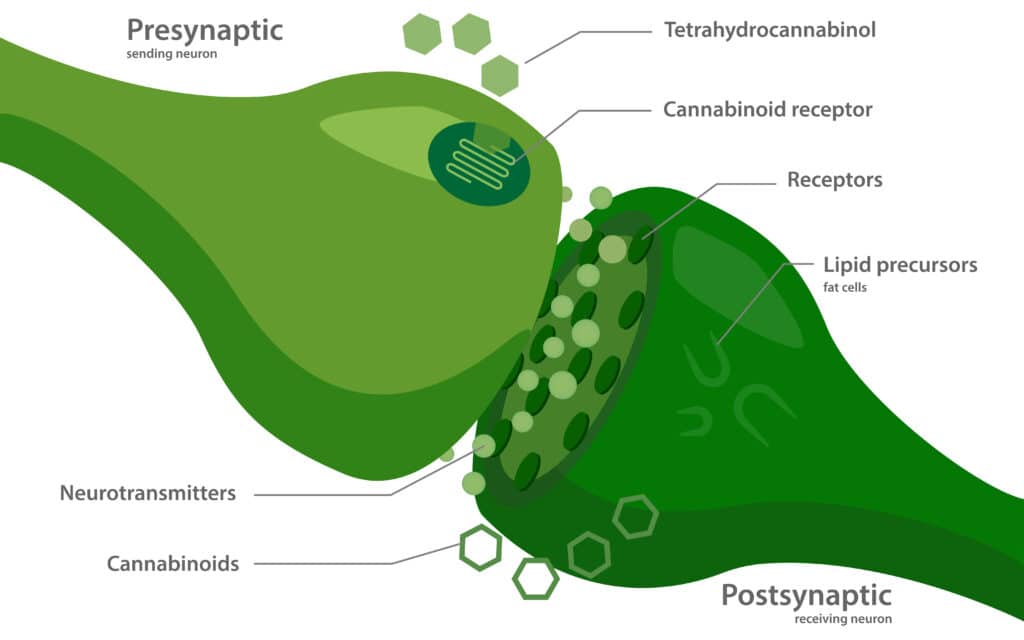
Cannabinoid. Interesting word, right? Sounds sort of like cannabis (a.k.a. marijuana). Most people are unaware of it, but we have an internal system called the endocannabinoid system that manufactures its own supplies of cannabis-like molecules. And despite the fact that very few people have ever heard of this system of the body, it’s one of the biggest players when it comes to your mood and energy levels.
The endocannabinoid system is plays a huge role in regulating our response to stress and helping us to re-establish homeostasis (optimal health).
The endocannabinoid system is involved with:
- Energy levels and alertness regulation
- Regulating inflammation
- Fighting stress, fear, pain, and anxiety
- Starting and stopping our body’s stress response
Given those four functions, it’s easy to see that if your endocannabinoid system isn’t functioning well, you’re going to have major problems. You’re going to be overwhelmed with stress, anxiety, and inflammation and your energy levels are going to suffer.
According to breakthrough new research titled Neurobiological Interactions Between Stress and the Endocannabinoid System, it’s becoming clear that we’ve been neglecting a critically important system of the brain when it comes to health, energy, and our ability to respond to stress. Here’s what the researchers concluded: “Collectively, these data create a compelling argument that endocannabinoid signaling is an important regulatory system in the brain that largely functions to buffer against many of the effects of stress…”[2]
Many researchers are now uncovering the links of how this system connects with all sorts of diseases. University of Washington neurologist Ethan Russo has done research suggesting that “’clinical endocannabinoid deficiency’ underlies migraines, fibromyalgia, irritable bowel disease, and a cluster of other degenerative conditions, which may respond favorably to cannabinoid therapies.” [3]
When stress is frequent and prolonged, it depletes and unbalances the endocannabinoid system. And since the endocannabinoid system is largely in charge of shutting down the body’s stress response system, this depletion of the endocannabinoid system is likely the key breaking point in the system that makes stress and dysfunction in our body chronic. That’s what makes it so our body can’t get back into balance, and then all sorts of problems emerge, like:
- We slowly lose the ability to properly ward off fear and anxiety.
- Since this system is responsible for shutting down the stress response, when it’s depleted, we lose the ability to turn off our stress response systems.
The reason I’m mentioning the endocannabinoid system first on this list is that it acts like the gatekeeper — it’s only once the endocannabinoid system is depleted that all these other mechanisms of how stress causes fatigue can take hold. Having a depleted endocannabinoid system is thus one of the major (or perhaps the major) mechanism that causes stress to become chronic and prevents the body from getting out of “stress mode.”
2. Throwing Off Neurotransmitters in the Brain
Your brain cells communicate with one another via compounds known as neurotransmitters. You’ve probably heard of some of these before, like serotonin or dopamine.
People also know of “neurotransmitter imbalances” which are thought to cause depression and other psychological and mood issues.
Here is the interesting part that many people are unaware of: Neurotransmitter imbalances do not usually just appear for no reason. Those neurotransmitter imbalances — what many think are the “cause” of many psychological issues — are themselves caused by other factors.
For example, chronic stress is a major factor known to induce deficiencies and imbalances of multiple neurotransmitters.
- Chronic stress reduces levels of serotonin and dopamine, which are important players in regulating our mood, tension, energy, and motivation. [4],[5],[6] Low levels of either of these neurotransmitters can contribute to depression, anxiety, binge eating, addiction, lethargy, apathy and anhedonia (inability to take pleasure in life).
- It can also affect other neurotransmitters like acetylcholine. Specifically, it can increase the activity of the enzyme that breaks down acetylcholine, so you end up with less acetylcholine in the brain. [7] That is a problem because acetylcholine is a main neurotransmitter in involved with stimulating wakefulness, cognitive performance, and energy. To sum up: Less acetylcholine means less energy.
- Chronic stress can also induce GABA resistance. [8] GABA is an inhibitory neurotransmitter, so by lowering the brain’s sensitivity to GABA, it essentially prevents the brain from efficiently going into relaxation and rejuvenation mode. To sum up: GABA resistance means that you’ll be more stimulated and have a tendency towards racing thoughts, more fears, more anxiety, more tension, and poorer sleep.
By disrupting the balance of neurotransmitters in the brain, chronic stress can wreak havoc on our energy levels and mood. So this is yet another way that stress causes fatigue.
3. Decreasing Thyroid Hormones

When it comes to energy (and just about everything else in our bodies, like immunity, cognitive function, muscle function, detoxification, libido, etc.), thyroid hormones are a major key.
If you want to know what happens when you don’t have adequate levels of thyroid hormones, just look up the symptoms of hypothyroidism. You will see things like fatigue, depression, anxiety, hair loss, chronic pain, muscle weakness, fat gain, and many others.
In short, if your thyroid hormones are low, the ability of all your cells to produce energy — from your brain cells to your heart cells to muscle cells to the cells of your liver and everything else — takes a hit.
And when the cells of all those systems of the body are not producing energy adequately, they function poorly. So you start to get those symptoms that I just mentioned.
Here is the key point: Chronic stress lowers thyroid function and levels of the thyroid hormones. [9] In other words, chronic stress can act in similar ways to hypothyroidism in causing symptoms like fatigue, depression, hair loss, fat gain, pain, and many others.
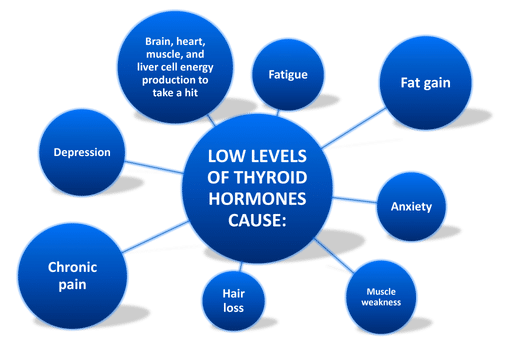
Lower thyroid hormones is yet another way that stress can wreck your energy (and predispose you to fat gain and all sorts of other health problems in the process).
4. HPA Axis Dysfunction
When the endocannabinoid system is depleted, that can lead to chronic activation of the stress-response system, the HPA Axis.
What is the HPA Axis?
The HPA axis includes 2 parts of the brain and one gland in the body:
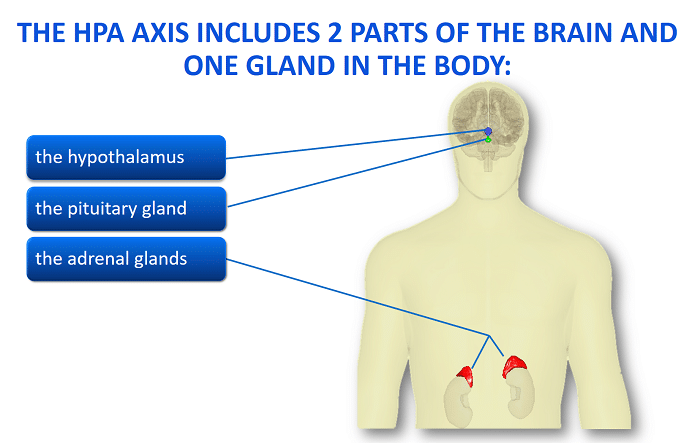
These three parts work together to regulate numerous aspects of our physiology—from our alertness and mood, to our digestion, to our stress response and immune function, to our appetite and metabolism, to our energy levels.
Here’s an overview of how the HPA-Axis functions:
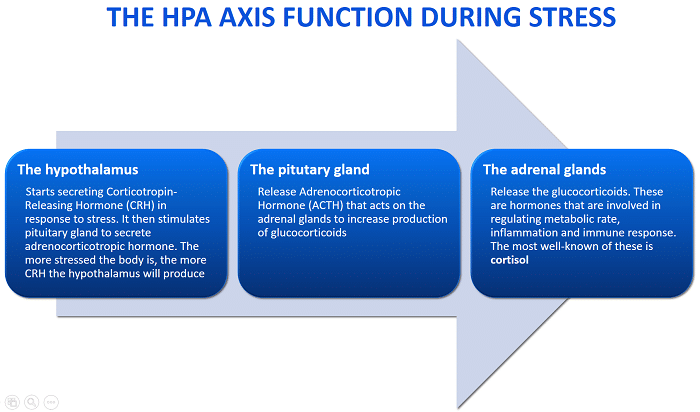
Normally, when the stress response system gets activated, it also immediately triggers a feedback loop that’s designed to shut down further stress system activation. This helps to calm you back down so you do not overproduce stress hormones or stay in a stressed state for too long.
But when you are chronically stressed (and the endocannabinoid system is depleted), the HPA Axis is chronically activated, then the HPA Axis starts to dysfunction. It starts to become resistant to the negative feedback loops telling it to calm down, which basically causes the whole system—HPA—to start to work abnormally. When the HPA Axis dysfunctions, all sorts of things can go wrong in the body. Chronic stress response activation and HPA Axis Dysfunction is now known to be associated with dozens of different medical conditions: [10],[11],[12],[13],[14]
- Burnout
- CFS and Fibromyalgia
- Anxiety disorders
- Depression
- Irritable Bowel Syndrome (IBS)
- Bipolar disorder
- Insomnia
- Post-Traumatic Stress Disorder (PTSD)
- Borderline personality
- Attention Deficit Hyperactivity Disorder (ADHD)
- Alcoholism
- Seasonal Affective Disorder (SAD)
- Diabetes
- Alzheimer’s
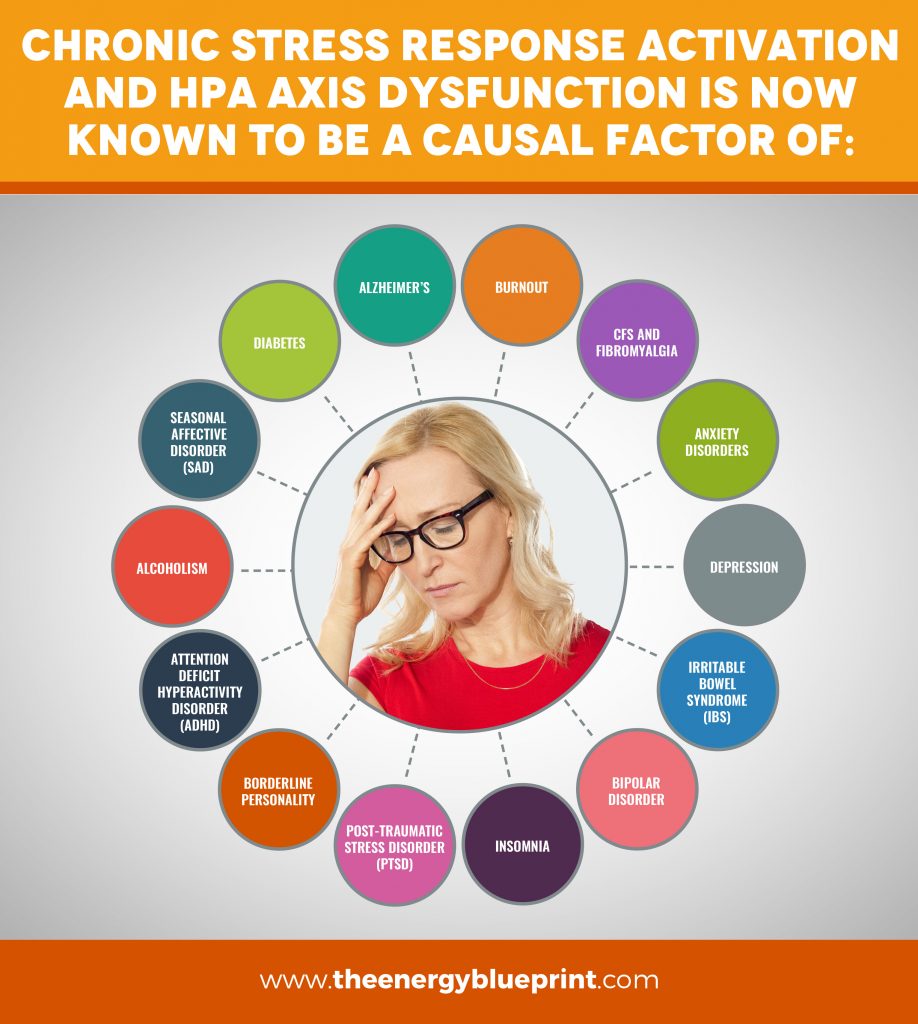
5. Lowering Your Intelligence
One of the other ways of stress causes fatigue is because it can indirectly harm energy levels is that it can quite literally make you dumber. It can actually shut down the centers of the brain involved in higher thought processes. According to Amsten et al, “Prefrontal cortical areas, which serve as the brain’s executive command centers, normally hold our emotions in check by sending signals to tone down activity in primitive brain systems. Under even everyday stresses, the prefrontal cortex can shut down, allowing the amygdala, a locus for regulating emotional activity, to take over, inducing mental paralysis and panic.” [15]
The reason this happens is that the kind of stresses our nervous system evolved for are not the same type of stresses we deal with today. If we had to run from a bear or from a rival tribe, we want the fear circuits to activate and switch on primitive survival physiology to help us get out of that physical danger.
The problem is that when you’re undergoing chronic psychological stress in the modern world, turning off your higher thinking centers and switching on fear circuitry does more harm than good. It makes the situation worse by leading to poor decision-making in almost every area of our lives, from work to relationships to making good choices in the context of lifestyle habits to support good health. For example, whether to break off a toxic relationship or not, whether go to the gym or not, or whether to eat a nutritious meal or McDonald’s, or whether to meditate or mindlessly browse social media. It’s easy to see how each of those decisions can sabotage your health and energy over time.
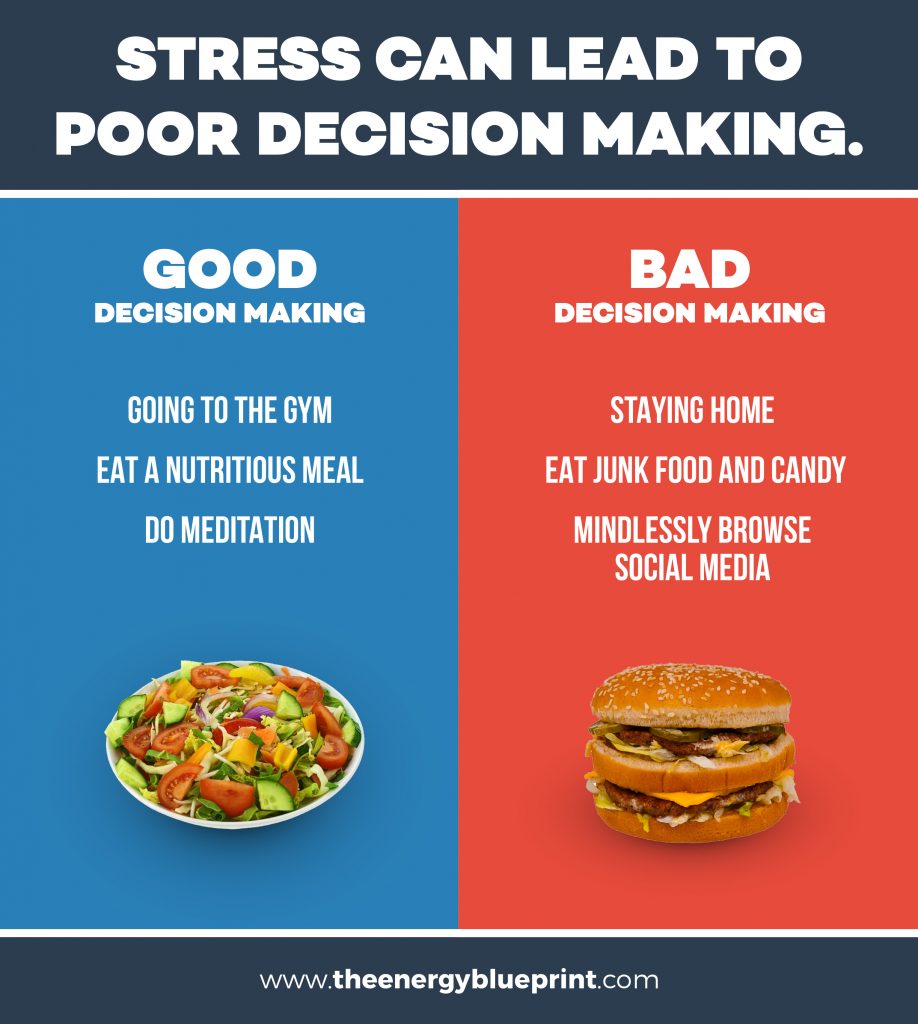
To make matters worse, it’s actually shutting down our self-control and higher-thinking centers, which makes it hard for us to even become aware of our self-sabotage behaviors and get ourselves back on track. In short, stress makes you act like you’re a lot less intelligent than you really are. And because poor lifestyle decisions impact your energy, this is another way stress causes fatigue.
6. Making You Hungry and Crave Sugar
Sugar cravings can lead to making poor food choices, which is another way that stress causes fatigue and can kill your energy. [16] If you are going for soda, doughnuts, candy, energy drinks, or cookies, it is a recipe for terrible energy levels.
The main reason why refined sugar can wreck your energy is the neurotransmitter orexin, which is the single most important neurotransmitter when it comes to wakefulness and energy levels. Don’t get thrown off by these sciency terms like “neurotransmitter” and “orexin.” All you need to remember is this: High Orexin = High Energy. And Low Orexin = Low Energy.
Poor food choices will directly impact on orexin for several reasons:
- Large glycemic (sugar) loads directly suppress orexin [17]
- Low fiber content and low protein content of the meals. Processed food rich in sugar tends to be low in both fiber and protein, which further suppresses orexin [18]
- Poor food choices (i.e. processed foods) tend to increase inflammation, and inflammation is the most potent suppressor of orexin [19]
Energy Drinks, especially, causes fatigue as they sap your energy levels. Check out how energy drinks causes fatigue HERE
So while those sugary foods may give you an initial jolt of energy, they are making your energy worse in the long haul.
7. Causing Chronic Inflammation
Chronic inflammation is now being linked as a causal factor in hundreds of diseases.
Despite that, the truth is that inflammation isn’t all bad. It’s actually an important natural biological response to many threatening agents such as microscopic invaders (bacteria, parasites, fungi, viruses, toxic compounds, and pollutants). It’s also part of our body’s response to wounds, infections and many disease processes. The main purpose it serves is to eliminate dead and damaged cells, which is a critical process to repair those tissues back to normal. So, inflammation is a very important and beneficial thing in our bodies. Indeed, we could not live without it.
But chronic inflammation is another story altogether. In normal healthy circumstances, the inflammation response happens rapidly and then goes away when no longer needed, after a few hours or a few days. But when it does not go away, that is when things get bad…
Mood problems, fatigue, fat gain, weird symptoms popping up.
With chronic inflammation, all sorts of things go wrong with our body. And chronic stress is a major cause of chronic inflammation.
If you know anything about the physiology of stress, it might seem counterintuitive that stress increases inflammation, because it is known that cortisol (our main stress hormone) is actually anti-inflammatory. But with chronic stress, the body loses the ability to regulate inflammation properly and the situation changes dramatically…
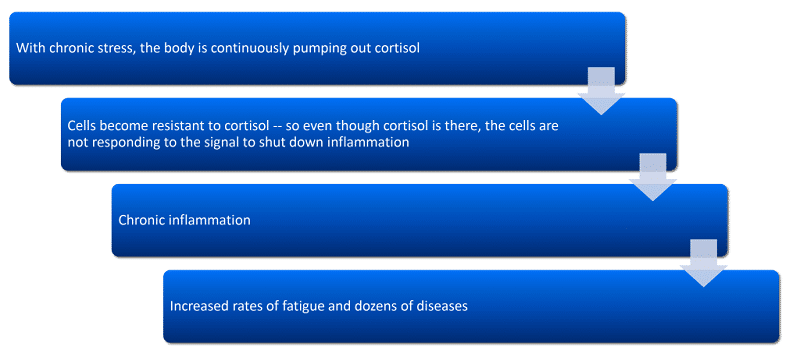
“Inflammation is partly regulated by the hormone cortisol and when cortisol is not allowed to serve this function (due to chronic stress), inflammation can get out of control,” according to Sheldon Cohen, a researcher in the field. [20]
Cohen argued that prolonged stress alters the effectiveness of cortisol to regulate the inflammatory response because it causes immune cells to stop hearing the signal from cortisol to shut down inflammation. Of course, if you can’t shut down inflammation properly, it becomes chronic.
Chronic inflammation is now being linked with almost every disease imaginable, from heart disease to various kinds of cancer to depression to Alzheimer’s and many others.
And it has a very clear and direct impact on our energy levels by shutting down orexin levels. (Remember, orexin is the most important neurotransmitter when it comes to energy levels).
To sum up: Chronic stress causes fatigue through chronic inflammation, as chronic inflammation is a recipe for fatigue.
To learn more about Joe Cohen’s work, check out the podcast I did with him on How to Biohack Fatigue HERE
8. Suppressing Your Immune System

One of the other ways that chronic stress can be damaging is through lowering immune function. [21]
While many people think that whenever they get sick, it is because they “caught” something from someone else — some new bug that is going around — that is actually not the case most of the time.
Our bodies are full of all sorts of potentially disease-causing germs all the time. In other words, the bugs are usually already inside of us!
When we are healthy and our immune system is functioning well, it keeps these bugs at bay.
But when our immunity is weakened, our bodies become susceptible to these invaders taking hold. (If you think back on it, you’ll probably realize that most of the times you have gotten sick are during times of stress, or sleep deprivation, or overexercising, or some combination of those). Thus, one of the big problems with chronic stress is that it chronically suppresses immune function.
This can lead to getting new infections as well as reactivation of old latent viruses in your system. When that happens regularly, the body is being chronically overtaxed and is suffering chronic oxidative damage in the cells.
Many types of viruses also specifically attack the mitochondria (the energy generators in our cells), thus causing a big hit to our cells’ ability to produce energy. (Infections are implicated as being a big player in chronic fatigue syndrome and fibromyalgia).

9. Disrupting Your Circadian Rhythm and Sleep
One of the most potent ways that stress causes fatigue is by impacting our sleep and circadian rhythm (the 24-hour biological clock in our brain that regulates our sleep and our wakefulness cycle). We’ve all had the experience of being stressed out by something going on in our lives and how that affects our sleep. Think racing thoughts keeping you up all night. Not very fun.
It is known that stress can disturb circadian rhythm. In turn, disrupted circadian rhythm results in all sorts of other issues:
- Depression
- Anxiety
- Lower resiliency in the face of stress
- Increased rates of dozens of diseases
- Daytime sleepiness and fatigue
Stress causes fatigue by directly impacting on sleep in many ways [22], [23]:
- It prolongs sleep latency (the time it takes you to fall asleep), which leads to chronic sleep deprivation
- It greatly decreases the amount of slow wave sleep (the type of sleep we need to properly regenerate at the cellular level)
- It can impact the emotional states you experience during sleep and dreaming, and can cause nightmares. This can lead to a vicious cycle where what’s happening during sleep is actually stressing you out even more instead of being a time when you are recovering from stress.
Loss of sleep (or poor sleep) is often regarded as the “mother of all health issues.” So the effects of stress on sleep should be a big concern of yours. This is perhaps the most common way that stress causes fatigue.
10. Making You Depressed
One of the other big problems with chronic stress is that it can trigger depression. By disrupting your mood and making you depressed, it can sabotage your energy levels.
Mood and energy levels are very much intertwined. Think about it: How many times in your life can you remember feeling like you are bursting with energy but also feeling really sad? How many times can you remember feeling terribly depressed but feeling like your energy is amazing? Both of those scenarios are extraordinarily rare. (Theoretically, if a severely depressed person smoked crack, they might be both depressed and energetic. But for most of us, we never experience that.)
Usually, energy and mood work together in positive upward spirals or negative downward spirals. Better moods facilitate better energy, and better energy facilitates better moods. And vice versa.
So one of the big problems with chronic stress is that it wrecks your mood. And along with that, your energy. There are many ways that stress wrecks your mood:
- CRH (corticotropin releasing hormone, a hormone released during stress) and dynorphin (a peptide in the brain released during stress) both are implicated in causing depressive episodes. [24],[25],[26]
- Chronic HPA activation is also known to induce depression. [27]
- Chronic stress can cause neurotransmitter resistance and imbalances in the brain (as we talked about previously), and those neurotransmitter effects are linked with depression. [28],[29]
- Chronic stress also decreases BDNF (an important peptide in keeping your brain cells healthy) and impairs neurogenesis (formation of new brain cells) — both of which are important in staving off depression.
- Chronic stress causes certain important energy-regulating areas of the brain to atrophy (something called dendritic retraction). [30]
All of these things are very bad news when it comes to your energy levels. As if the feeling of depression weren’t bad enough, you now have all sorts of other physiological mechanisms that are suppressing your energy.
11. Causing Chronic Physical Pain
One of the biggest problems with chronic stress are the effects on the brain. We just talked about some of those effects in the last point on depression, with how stress affects neurotransmitters, BDNF, and chronic HPA activation.
But here is the even bigger issue beyond these specific individual mechanisms: chronic stress causes fatigue by literally changing the structure and function of your spinal cord and brain in profound ways. Let me explain how this happens:
Pain response in a healthy body:
- Pain signals from the body travel through nerves to the spinal cord and then up to the brain.
- The brain then processes this information and we get the sensation of pain.
Pain response in a chronically stressed body:
- When chronically stressed, the brain begins to process these pain sensations with greater and greater sensitivity
- Less of an actual stimulus (sensation) is needed to induce pain
- In severe chronic stress and pain that’s gone on for years, can get so severe that a person will feel even a light caressing touch as a sharp pain. This doesn’t happen because the touch was actually harming the body, but because their nervous system and brain have been rewired into being so oversensitive that every sensation is not felt as pain.
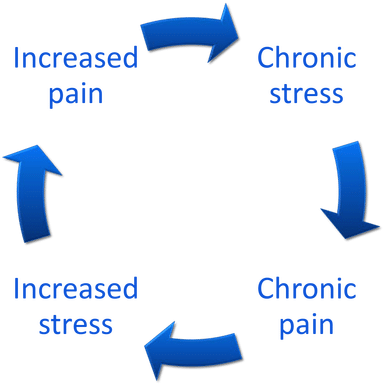
Normally, pain signals from the body travel through nerves to the spinal cord and then up to the brain. The brain then processes this information and we get the sensation of pain.
But with chronic stress, the brain begins to process these pain sensations with greater and greater sensitivity. So less and less of an actual stimulus (sensation) is needed to induce pain. In severe chronic stress and pain that’s gone on for years, this can get so severe that a person will feel even a light caressing touch as a sharp pain. (This is often the case in fibromyalgia, for example).
This does not happen because the touch was actually harming their body, but because their nervous system and brain have now been rewired into being so oversensitive that every sensation is now felt as pain.
12. Lowering Many Beneficial Hormones
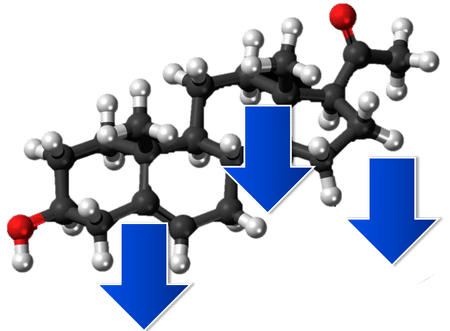
Another reason why stress causes fatigue is that it lowers your levels of many important hormones.
To understand what is going on here, you first need to understand a hormone called pregnenolone. Pregnenolone is a precursor hormone that can be used to make both stress hormones and sex hormones.
Whether it makes more stress hormones or sex hormones is largely dependent on the signals it is getting from the environment.
Basically, the body is asking “is the primary objective to procreate or to run for your life?”
So there is a sort of trade-off here — the more you place a demand on your body to make stress hormones (by being chronically stressed), the less of the anti-aging, energy-enhancing hormones you make.
If the body is getting a lot of stress signal, the adrenals will “steal” the pregnenolone away from being used to make sex hormones like testosterone and progesterone (which generally have very positive effects on our bodies) in order to make stress hormones. [33] Hence why this state of physiology is often referred to as “pregnenolone steal syndrome.”
This is a particularly bad situation for women because the majority of their testosterone (yes, women have testosterone too, and it is very important to their health!) is produced in the adrenal glands. (In men, it happens in the testes). The adrenals are particularly affected by pregnenolone stealing due to stress. So it is often women’s sex hormones that get hit the hardest by stress.
Anti-inflammatory, antioxidant, anti-stress mood, and energy enhancing hormones:
- Dehydroepiandrosterone (DHEA)
- Progesterone
- Testosterone
- Pregnenolone
But even in men (although testosterone is produced in the testes), chronic stress is still known to lower testosterone levels. [34]
The basic idea is that pregnenolone, DHEA, testosterone, and progesterone are anti-stress hormones, as well as mood and energy enhancing hormones.
They all take a hit with chronic stress, so all those functions in your body take a hit too.
In other words, when those hormones take a hit, you are likely to be more inflamed, in a poorer mood, performing worse, with higher stress and anxiety levels, and lower energy.
13. Damaging Your Mitochondria
Chronic psychological stress can also cause uncontrolled oxidative damage in our cells.
You have probably heard of “free radicals” and “antioxidants” before — i.e. the notion that antioxidants are good because they prevent free radicals from damaging our cells.
It turns out that the common notion of antioxidants as “good” and free radicals as “bad” is horribly inaccurate (despite how common it is for people to believe this idea — both regular people and even health professionals). Preventing damage in your cells is just not as simple as taking a bunch of antioxidant supplements. That’s why the vast majority of research on antioxidant supplementation fails to show benefits. The reality is that we actually have an internal antioxidant defense system inside our cells, and as long as the free radicals do not overwhelm our body’s capacity to handle them, they are not harmful in any way. In fact, they are beneficial to health when at a level that our bodies can handle. Think of exercise — exercise actually produces free radicals, or oxidants, and yet is beneficial rather than harmful to our health!
Short-lived things that produce free radicals (like exercise) can be very beneficial, but too much chronic oxidative damage (from free radicals) in our cells is a very bad thing.
The key distinction is this:
This situation does not really occur as a result of a deficiency of antioxidants in our diet, but when a stressor becomes so big and chronic that our internal antioxidant defense system is overwhelmed. (example: running two marathons a day every day vs. doing just 30-60 minutes a day of moderate-intense exercise). Reasonably amounts of daily exercise is extremely beneficial to your health, but if you do extreme amounts, you overwhelm the body’s antioxidant defenses and actually cause harm. That’s why they have the saying “The dose makes the poison.”
Basically, when you have a chronic imbalance between the amount of stress occurring vs. your body’s capacity to handle stress, you’re going to get oxidative damage.
The same is true with psychological stress — the big problem is not all psychological stress. In small doses happening occasionally and then going away, psychological stress can actually be a good thing! It can make you tougher, more courageous, mentally stronger, and can stimulate you to grow as a person in every way imaginable. In fact, without any occasional stress in our lives, it is likely we would never grow! We’d feel no sense of purpose or meaning in our lives, and no sense of triumph if we never have anything challenging to do.
The big problem — much like the example above of running two marathons a day — is that when psychological stress becomes chronic, it wreaks havoc on our bodies. It will overwhelm our body’s internal antioxidant defense system and will result in uncontrolled oxidative stress.
In a study done in women where they compared one group on a junk food diet who were not stressed to another group on the same diet but also under chronic stress, the women who were chronically stressed had double the level of oxidative stress compared to those who ate a junk food diet and were not stressed. [35]
This chronic uncontrolled oxidative stress can cause a number of problems that will result in low energy levels, but the two biggest are:
- It damages the mitochondria (which directly lowers our cells’ capacity to produce energy). [36] [37]
- It can cause inflammation, which can damage key parts of the brain (namely the hypothalamus) that produce key neurotransmitters that regulate energy levels, like orexin.
14. Inducing a Leaky Brain Barrier
Our brain comes built with a sort of filter that’s designed to make sure that substances which shouldn’t get into the brain stay out of the brain. The problem is that chronic stress can cause certain types of immune cells in the brain to release histamine and various inflammatory compounds. Over time, these chemicals can increase permeability in the brain barrier. [38]
This basically means that substances which would normally be prevented from getting into the brain are now getting in, which leads to inflammation in the brain.
In turn, inflammation in the brain can wreak havoc on all sorts of brain areas that impact on health and energy. It’s related to depression and other mood problems, numerous brain diseases, and of course, fatigue.

15. Flushing Out Beneficial Minerals
Chronic stress and HPA activation will also impact on mineral retention by the kidneys. We end up getting rid of more potassium and magnesium and hanging on to more sodium. [39],[40] This is especially problematic because most of us are already eat diets deficient in potassium and magnesium.
We need potassium to:
- Regulate electrical activity of nerves and cells throughout the body
- Regulate activity of the heart
- Build proteins
- Break down and use carbohydrates
- Build muscle
- Control the acid-base balance
Magnesium is an essential mineral that is involved in over 300 metabolic processes in our bodies.
Magnesium is involved in:
- Cellular energy production
- DNA synthesis
- Cell signaling
- Regulating electrical activity in the brain, heart, and muscles.
- Detoxification
So it is easy to see why depleting these vital minerals can lead to all sorts of problems, including fatigue.
16. Inducing Leaky Gut
Another way that stress causes fatigue us is the way it affects our gut. There’s much talk of “leaky gut” these days and all sorts of complex theories around what may cause it. And to be clear, much of that is valid. [41],[42],[43]
But the science actually indicates that stress itself can directly cause increased gut permeability (“leaky gut”)! This causes a number of issues:
- It increases the amount of bacterial toxin (endotoxin) leaking into the bloodstream. This is a major cause of chronic inflammation. This process has been implicated in fat gain, anxiety, depression, inflammation, stress, fatigue, autoimmune diseases, and numerous other diseases. [44] By the way, it’s worth noting that endotoxin and leaky gut can induce low cortisol levels — without ever needing to invoke any explanation around “fatigued” adrenal glands. Chronic exposure to toxins and inflammation will cause the body to intentionally lower cortisol levels. I.e. It’s not an accident or the result of “worn out” adrenals — the body is doing it on purpose. Low cortisol levels can then contribute to trouble sleeping, depression, fatigue, low blood sugar, brain fog, and many other problems.
- It can cause food sensitivities and intolerances [45]
- It can contribute to irritable bowel syndrome (IBS) [46]
- It can decrease flow in the small intestine, which can lead to overgrowth of harmful bacterial species [47]
- It can cause gut pain and increase your sensitivity to gut pain [48]
- The inflammation caused by leaky gut directly shuts down the neurotransmitter orexin, which makes you tired and low energy.
Poor gut health is a recipe for poor energy levels. So this is yet another way that stress causes fatigue.
6 Powerful Strategies On How To Overcome Stress And Get Your Energy Back!
Since I have now told you all the ways that stress causes fatigue, let us talk about how to overcome stress so you can start addressing and fixing the problem.
1. Minimizing or Eliminating Stimulants (at least temporarily)
While it is not known by most people, caffeine use (and nicotine use) have been scientifically proven to have numerous benefits for both mental and physical performance, and even in health and disease prevention in many cases.
However, chronic use of stimulants can be counterproductive. There are several reasons why. For one, it tends to stimulate the stress-response pathways of the body — so if you’re already stressed and have overactive stress response systems in your body, caffeine will stimulate those systems even more. Also, it can create too much release of stimulating neurotransmitters in the brain, which eventually leads to neurotransmitter resistance and imbalances of several neurotransmitter systems in the brain. (I go through the science on coffee and energy levels in this video).
To sum up, what I go over in that article, caffeine works by blocking one of the brain’s neurotransmitters called adenosine. Adenosine normally works to calm the brain and make you relaxed. So by blocking adenosine, caffeine creates a stimulating and energizing effect. The problem is that when you do this every day, the brain feels overstimulated and then actually creates negative neurotransmitter adaptations to try to calm itself back down. What that ultimately means for you is that it lowers your baseline levels of mood, performance, and energy.
How To Overcome Stress And Coffee Addiction
If you currently are a coffee addict, your goal is to slowly and progressively ween yourself off of it over the coming 4-8 weeks. Decaf is your friend! Then get yourself clean for at least 3-6 weeks. I have more details on how to do this in this article on coffee and fatigue. (Note: If you are a daily caffeine consumer now, be aware that it is a drug dependence, so you are going to experience drug withdrawal symptoms like fatigue and headaches for the first 7-10 days that you go off. You can minimize or eliminate those symptoms by weaning off instead of going cold turkey.)
Trust me when I tell you that it’s worth it — your energy, mood, and performance will all increase after you go through this process as it is step one on the way to overcome stress.
2. How To Overcome Stress By Lowering Your Sensory Load
Most of us living in the modern world are now constantly bombarded by flickering lights, rapidly changing sights and sounds, social media, text, phone, email, TVs, phones, music, games, movies. And all of that is on top of the hectic lives we live. These things are all foreign to our biology and tax our brain on a level that it has never been taxed before in human history.
To cope, the brain is constantly trying to figure out how to overcome stress and find a way to calm itself down. It does this primarily through trying to increase the “inhibitory neurotransmitters,” serotonin and GABA. But when these systems are constantly taxed in this way, it’s a losing battle and you eventually wear out the system and start to create neurotransmitter imbalances.
So think about the following activities you may be doing:
- Always being on the go doing things without taking breaks to recharge.
- Listening to loud aggressive music while driving or exercising.
- Getting involved in exciting, fast-moving or violent movies (or games) before going to bed
- Staring at a computer monitor for most of your workday. (Most people don’t realize it, but computer monitors actually flicker — they do it so fast that we can’t detect it with our naked eye — and that flicker actually is another source eye strain and on the visual processing centers of the brain that drains your energy. This is why they have now invented flicker-free monitors. I highly recommend getting one if you spend a lot of time on a computer each day. Here is where you can purchase one on Amazon.com).
- Staring at the TV for hours.
- Listening to overly stimulating background music (or listening to music with lyrics while working).
- Being indoors under artificial light (especially fluorescent lighting) for most of the day. (Note: Fluorescent lights also flicker, which causes eye strain and drains your energy).
What to do to lower stimuli to the sensory organs
- Do not watch the news, fast-paced, or violent movies within 1 hour of bedtime.
- Take small 5 minute breaks throughout your day doing something you enjoy.
- Get outside for at least 30 minutes a day. If you can get into nature, even better.
3. Optimizing Your Circadian Rhythm and Sleep
In the previous chapter on how stress causes fatigue, I talked about how stress causes a lot of sleepless nights due to racing thoughts which, ultimately, leads to depression, anxiety, and a whole lot of diseases.
That is why I started looking for ways on how to overcome stress and optimize the circadian rhythm.
To do this, I recommend 3 basic things:
Wear blue blocker glasses at least one hour before bed, preferably 2-3. I recommend the SafetyBlue SleepSavior brand (You can learn more about them here).
Download f.lux or Twilight apps on your computer, tablet and phone. These free apps will automatically lower the blue light emission of your device after sunset. (Note: There is no such app for televisions, so if you want to watch TV, you’ll need the blue blocking glasses.)
Get incandescent bulbs or red or amber colored bulbs for a few lights in your house in the areas you spend time in at night after sunset, as well as your bedroom and bathroom. Then after sunset, ONLY use those light sources (rather than your standard fluorescent or LED lights you’d normally use)
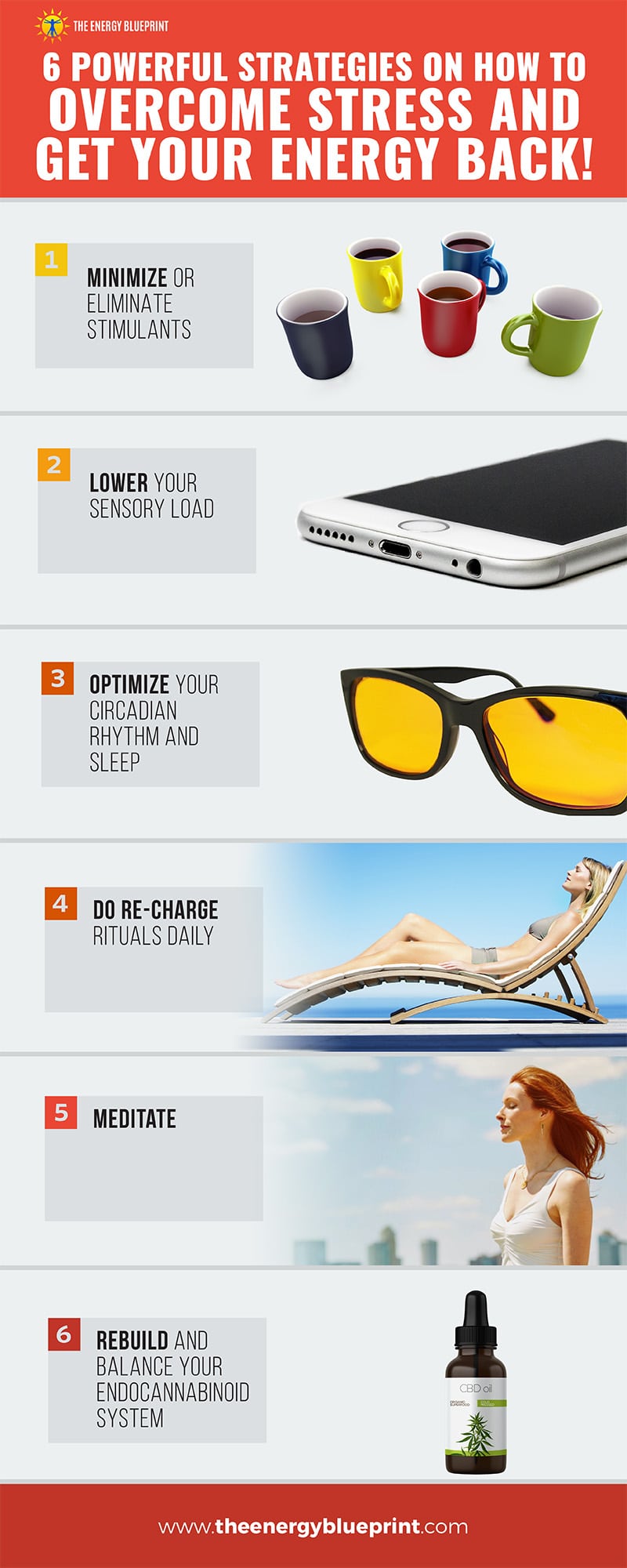
4. Doing Re-Charge Rituals Daily!
Learning to operate your brain optimally (i.e. to not be in “stress mode” all the time) centers around building Re-Charge Rituals into your life.
What are Re-Charge Rituals? They are predetermined periods of the day where you engage in consciously cultivating the kinds of brain performance habits you want.
You can’t expect your brain to know how to overcome stress, be good at relaxation, happiness, being in a state of high energy, focus, laughter/play, and gratitude … if you aren’t consciously building those brain pathways.
Or worse, if you’re unconsciously building the opposite brain pathways, as most people are. If your daily practice is running around like a chicken with its head cut off, always running from one thing to the next, getting distracted with every email and text on your phone, using caffeine to get yourself going, feeling stressed and irritated, then guess what your brain will eventually learn to get good at? Yup, being in stress mode.
Building Re-Charge Rituals into your life is the way out of that mess. There are three critical types of Re-Charge Rituals you want to implement:
- Morning Ritual
- Night-Time Ritual
- Brief Rituals Interspersed Throughout The Day (ideally for 1-5 minutes every hour)
Why these 3 times? The bookends of the day program your brain how to behave!
How you start and end your day likely “program” the brain for what kinds of neural circuits to prune and which to reinforce. Are you starting and ending your day unconsciously with stressful, stimulating, ADD-promoting, anxiety-promoting behaviors? Or are you starting and ending your day by consciously putting in information and emotional experiences that program your brain for love, happiness, relaxation, focus, joy, and serenity?
If you want to have great energy levels, you better be doing the latter of those two options!
Here is a list of the most powerful strategies on how to overcome stress by using these in your Re-Charge Rituals:
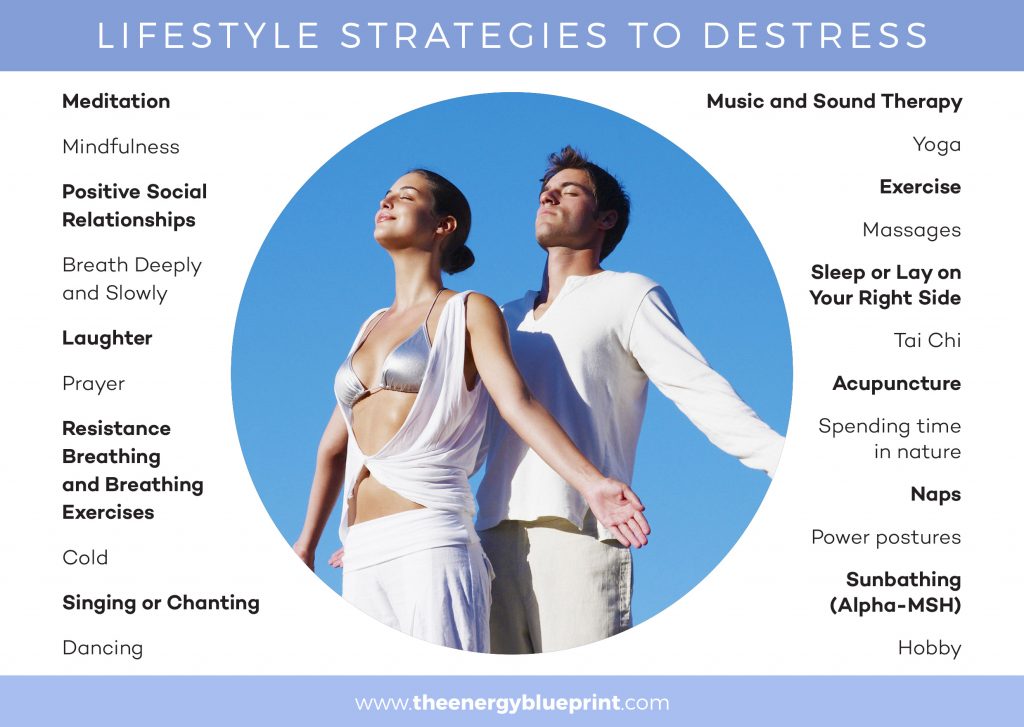
- Mindfulness
- Positive Social Relationships
- Breathe Deeply and Slowly
- Laughter
- Meditation
- Prayer
- Resistance Breathing and Breathing Exercises
- Cold
- Singing or Chanting
- Dancing
- Music and Sound Therapy
- Yoga
- Exercise
- Massages
- Sleep or Lay on Your Right Side
- Tai Chi
- Acupuncture
- Spending time in nature
- Naps
- Power postures
- Sunbathing
- Hobby
Identify which specific techniques work for your personality and build a set of daily re-charge rituals into your life using those. Re-Charge Rituals are incredibly powerful when you use them daily. Trust me — you’ll thank me later.
5. How To Overcome Stress By Meditating
Technically, meditation falls into the category above on Re-Charge Rituals, but it’s so powerful and so important that I feel it deserves its own section.
The benefits of meditation are vast and are backed by a mountain of scientific evidence. Research has proven that meditation can:
- Decrease stress [49]
- Decrease anxiety [50]
- Decrease feelings of loneliness [51]
- Improves your ability to regulate your mood and emotions [52]
- Decreases depression and makes you a happier person [53], [54], [55]
- Decreases pain [56]
- Decreases inflammation [57]
- Increases your sense of connection to others [58], [59]
- Improves cognitive performance [60], [61], [62]
- Literally re-shapes your brain in powerful (and beneficial ways) [63], [64], [65]
In short, if you don’t meditate, you’re missing out on one of the most powerful forms of medicine that is available to humans. If there were a prescription drug that could do even half of what meditation has already been scientifically proven to do, that drug would be a trillion-dollar blockbuster that is prescribed to hundreds of millions of people. Here’s the cool part: The drug exists — it’s just that instead of popping a pill, you meditate.
I’ve been meditating using various practices off and on for over a decade, but as of recently, I have stumbled across the single best meditation method I’ve ever found in over a decade of searching. It’s called zivaONLINE, and I cannot recommend it more highly as a tool on how to overcome stress. I have taken the course myself and now practice twice a day. I consider meditation to be the single most powerful strategy for overcoming stress in existence, and zivaONLINE is the single best method I’ve ever found. (And don’t worry — there’s no culty stuff, and you’re not asked to follow any religious doctrine or dogma to do this). You can do the course here
If you want to know more learn more about how to overcome stress through meditation., listen to the podcast I have had the pleasure of making with Emily Fletcher, the founder of ZivaONLINE. Check it out HERE
6. Rebuilding and Balancing Your Endocannabinoid System
Remember, to get your body to be able to shut down “stress mode” and go into “safe mode” and “relaxation and regeneration mode,” your endocannabinoid system must be optimized. Without that, you’re going to stay stuck in stress mode no matter what you do.
So how do you actually rebuild and rebalance your endocannabinoid system?
Here are a few strategies to start rebuilding your endocannabinoid system:
- De-stress. Follow the previous recommendations to de-stress, as they are one of the key factors in how to overcome stress — in particular, building Re-Charge Rituals into your life. Ultimately, the endocannabinoid system becomes strained through physical and mental stress, so avoiding stress like the plague is critical to give your endocannabinoid system the opportunity to rebuild.
- Omega 3s. Omega-3 fats are vital to the health of your endocannabinoid system. Omega 3 fats help balance the endocannabinoid system by decreasing CB1 activity and increasing CB2 activity. Research has now linked the interaction of omega-3s with the endocannabinoid receptors in the brain with protecting the brain cells from damage and inflammation. [66] (If you’re supplementing, I strongly recommend krill oil over fish oil. And make sure to get a brand without cheap vegetable oil fillers. Krill oil also has the added benefit of astaxanthin, which is a powerful neuroprotective and anti-inflammatory compound. I recommend this powerful krill oil with high-dose astaxanthin from our store: Krill oil and astaxanthin combo.)
- Greens are a wonderful source of beta-caryophyllene, which is a phytocannabinoid that has powerful balancing effects on the endocannabinoid system by stimulating CB2 activity. Strive to double or triple the amount of dark green leafy veggies you eat each day. Try to eat greens in every meal.
- Cut Alcohol. Alcohol is a must-avoid compound when trying to rebuild your endocannabinoid system because it counteracts all the things we’re trying to do with balancing out our endocannabinoid activity.
- Massage, acupressure mats (or acupuncture) and self-myofascial release. This is another tool that studies have found promote a balanced endocannabinoid system.
- Use CBD. I’ve saved perhaps the most powerful strategy on how to overcome stress, for last. CBD, which stands for cannabidiol is a powerful endocannabinoid signaler found in marijuana and hemp plants. (To be clear, it is 100% legal in all 50 states, because it can also be extracted from hemp. It’s not psychoactive, like marijuana—the high comes from another compound called THC.) It is a powerful anti-anxiety and anti-stress cannabinoid signaling compound that supports endocannabinoid system balance. Hundreds of studies have now been done to show that CBD can benefit human physiology in numerous ways. (See here if you’re interested in seeing the research: https://www.projectcbd.org/conditions). To make a long story short, if you’ve been under chronic stress, CBD is simply one of the most beneficial compounds in existence. The one I recommend is from BluebirdBotanicals. I suggest using oral CBD, and here is the one I suggest getting. Also note that Bluebird Botanicals has been rated as the #1 CBD on the market, so that’s why I recommend getting your CBD from them.
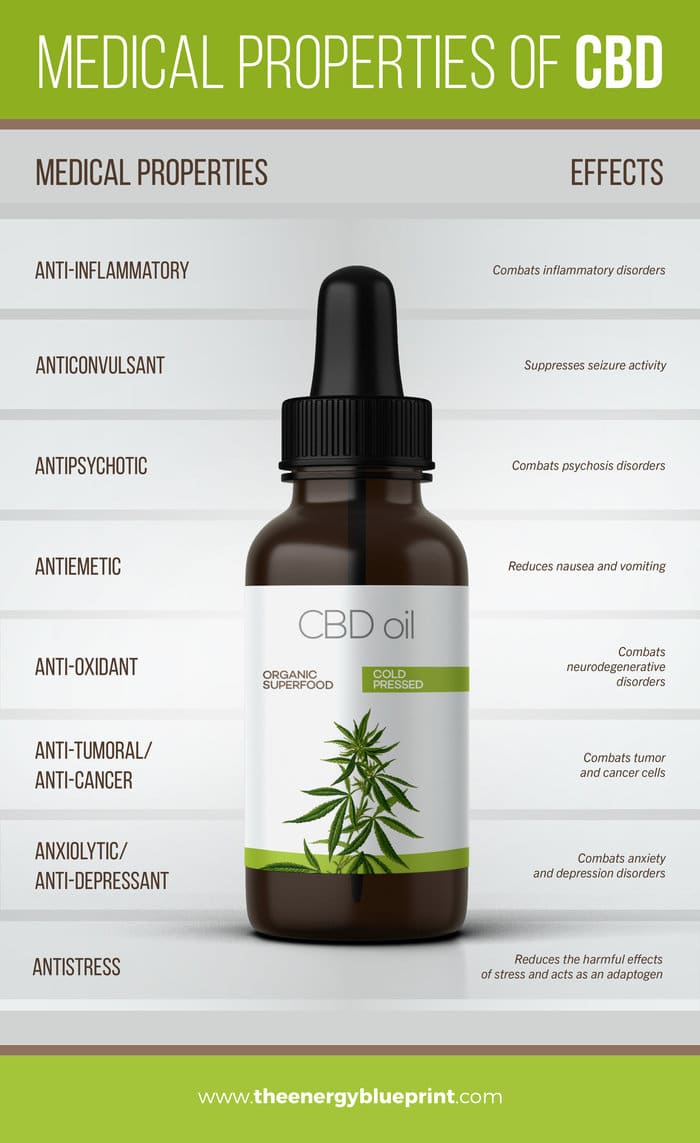
Recap
Stress is an energy killer. And while most people talk about the relationship between stress and energy by talking about “adrenal fatigue,” the reality is that stress does so much more damage to us than simply “fatiguing our adrenal glands” (as most people think). And most of the ways stress causes fatigue have nothing to do with our adrenal glands.
You now know 16 different mechanisms in the body that that explain how stress causes fatigue.
Hopefully, you now know how intertwined all of these factors are — stress, inflammation, mood, gut permeability, energy, pain, brain performance, sleep, immune function, the metabolism, mitochondrial health, and energy production. All of these exist in deeply intertwined cycles, where positive influences create positive input into all the other factors, and negative influences feed negative input into all the others.
Most people are stuck in creating negative downward spirals of more stress, inflammation, depression, anxiety, fatigue, sickness, poor sleep, and poor cellular energy production.
How to overcome stress, moving forward
What you want to do is use the 6 powerful strategies on how to overcome stress and get your energy back, in this article to break that cycle and create positive upward spirals of low stress, low inflammation, positive mood, great sleep, resistance to infection, and big healthy mitochondria that are pumping out lots of energy.







